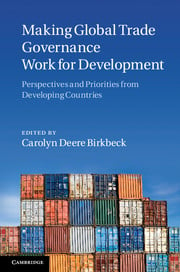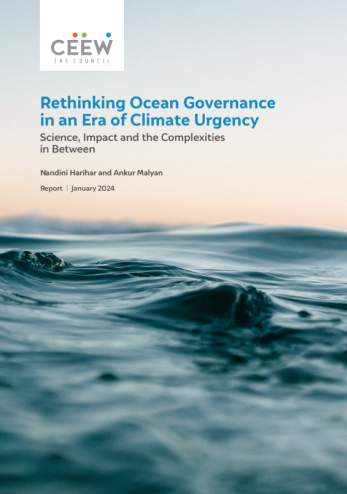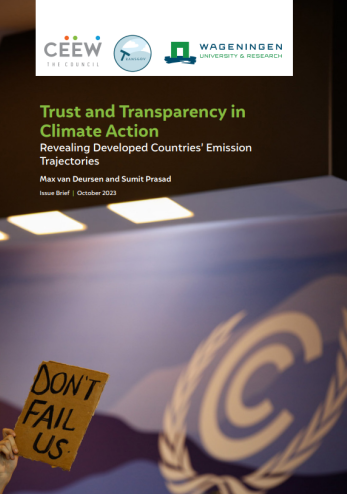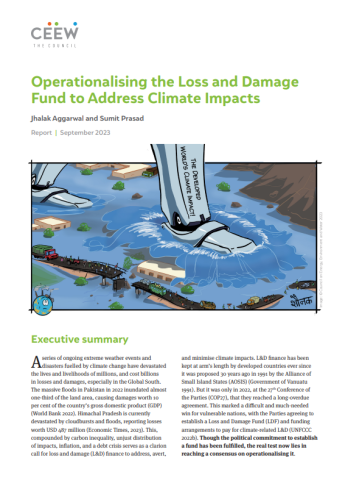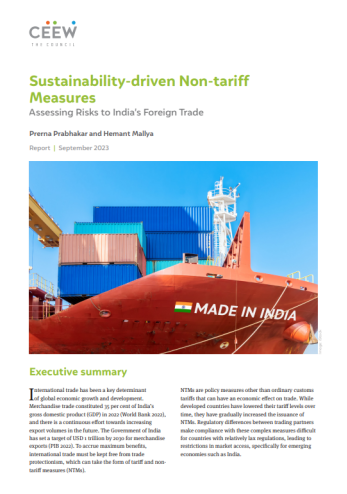Book Chapter
Strengthening WTO Surveillance
Making transparency work for developing countries
Arunabha Ghosh
September 2011 | International Cooperation
Suggested citation: Arunabha Ghosh. 2011. “Strengthening WTO Surveillance: Making Transparency Work for Developing Countries,” in Making Global Trade Governance Work for Development, edited by Carolyn Deere-Birkbeck. Cambridge: Cambridge University Press.
Overview
This chapter focuses on institutionalised surveillance mechanisms that have a role in promoting compliance and evaluating the impact of members’ policies on the trade regime as a whole. The most institutionalised trade format is the Trade Policy Review Mechanism (TPRM) but this chapter also analyses recent developments of three other mechanisms i.e. targeting regional trade agreements, food safety standards, and Aid for Trade. It gives a brief history of the evolution of surveillance in the multilateral trade regime and critically examines the TPRM’s mandate and the content-and-process-related challenges that it had faced. It also outlines the minimal reforms that have been made to the TPRM thus far and explores why developing countries have not pushed for further changes. This chapter also examines WTO’s monitoring to analyse how it has responded to calls for improved transparency and whether it meets developing countries’ needs in the trade regime.
Key Highlights
- The TPRM seems to be serving those countries that already have resources to monitor other members. For the WTO’s poorer members, TPRM reports and procedures have to provide more relevant information and improve domestic monitoring capacity as a step towards multilateral participation.
- Despite the growing influence of developing countries in key aspects of trade negotiations, they are of the view that the TPRM offers little chance of shifting rich countries’ policies. Maintaining a status quo remains a preferred option.
- Developing countries demand more timely information and reviews to be conducted in the context of economic development needs, and more comprehensive TPR reports. Some countries want wider dissemination of reports and follow-up documents on measures taken.
- Trade experts from developed and developing countries recommend tougher ‘real-time surveillance’, especially of hidden details in domestic support measures.
- The calls for greater surveillance also reflect the demand for advance warning and impact analyses and, to an extent, compliance-oriented information.
- Aid for Trade (AFT) is aimed at developing countries that could help them expand their trade and implement and benefit from WTO agreements.
- In February 2006 the WTO created an AFT task force with the aim of ‘operationalising’ AFT. It had recommended that ‘Monitoring and evaluation progress is essential in building confidence that increased Aid for Trade will be delivered and effectively used’.
- Larger developing countries, as well as developed countries, also supported the idea of a more rigorous and compliance-oriented monitoring mechanism for AFT.
- There has been little consensus on how to improve the content of PRM reports as the developing countries fear that more analytical reports would target their policies more than the rich ones.
- Developing countries have engaged in designing new surveillance in areas of relevance to them. They demand that new mechanisms respond to their information needs and capacity constraints and also help compliance in rich countries.
Key Recommendations
- Target WTO members’ reporting behaviour and expose laggards
- Increase developing countries’ representation among discussants
- Make high-level representation mandatory for review meetings
- Increase media coverage of reviews
- Request the Secretariat or non-State actors to publish follow-up documents to show how countries have responded to concerns raised in review meetings
For developing countries, resource constraints are the dominant information gap, since it affects their ability to invest in additional research to reduce issue uncertainties or to monitor other States to discover hidden/inaccurate information.




